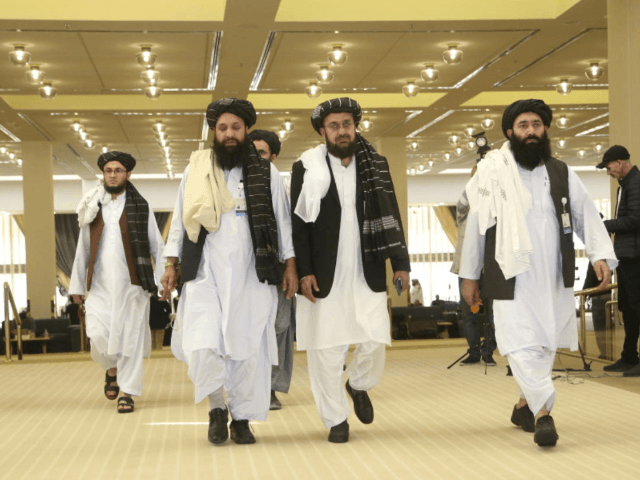The Islamic regime in Iran hosted members of the Taliban “political office” in Qatar on Wednesday for negotiations with the legitimate government of Afghanistan, an attempt to elevate Iran’s influence in the country as American troops withdraw.
Iran is a Shiite Muslim autocracy, which has resulted in decades of tensions with the Taliban, a Sunni jihadist terrorist organization. Tehran has recently turned that relationship around, however, by offering itself as a venue for Taliban political leaders to engage in diplomacy and legitimize their claim to lead Afghanistan. The Taliban considers itself, formally the “Islamic Emirate of Afghanistan,” the country’s official government and the legitimate administration in Kabul a Western-backed usurpation.
The Taliban entered the Tehran talks on Wednesday after a month of successive victories nationwide, particularly near Afghanistan’s northern borders with Tajikistan and Uzbekistan. Taliban jihadists have claimed to take over dozens of districts in the region, many of them, Taliban spokesmen claim, without a fight. Afghan officials have denied that their soldiers have defected to the Taliban but admitted that hundreds have fled and attempted to seek refuge in Tajikistan.
Iran’s state-run PressTV reported on Wednesday that the talks in the nation’s capital will consist of four delegations, “including representatives of the Afghan government and parliament, the Taliban group and prominent figures supporting the Republic system.” Iranian news outlets did not specify what topics the two sides expected to discuss. Taliban spokesman Zabihullah Mujahid added more clarity in a statement on his Twitter account, accompanied by photos and videos of the event.
“The delegation of the Islamic Emirate [the Taliban] in Tehran met with the Minister of Foreign Affairs of the Islamic Republic of Iran and some Afghan personalities who have traveled to that country,” Mujahid said, downplaying the significance of legitimate Afghan government officials. “The topics of discussion are the issues of refugees and the border with Iran, as well as the issue of security and peace in Afghanistan and the region.”
Afghanistan’s Tolo News described the talks in Tehran on Wednesday as meta-talks about the ongoing “peace talks” between the two Afghan factions. Those talks, endorsed by the United States, are intended to end Taliban hostilities against the government by offering the jihadists positions within the legitimate government, enticing them to give up their weapons. Those talks, facilitated by the government of Qatar, have stalled. Senior Afghan government adviser Mustafa Mastoor told Tolo News that its progress is “very slow and not focused on substantial issues” at the moment.
At the talks, Iranian Foreign Minister Mohammad Javad Zarif used the opportunity to attack the United States, celebrating its “defeat” in Afghanistan and offering Iran as an allegedly more worthwhile dialogue partner than Washington.
“Warning against the undesirable consequences of lingering conflicts in Afghanistan, the top Iranian diplomat said the best option for Afghan leaders and political currents is to return to the intra-Afghan negotiation table and remain committed to the political solutions,” Iran’s Tasnim News Agency reported. “Zarif also expressed Iran’s readiness to contribute to the process of negotiations among the Afghan parties for the settlement of conflicts and crises.”
“The United States has failed in Afghanistan…and its presence in the country for more than two decades has caused major damage in Afghanistan,” PressTV quoted Zarif as saying. “Today, the people and political leaders of Afghanistan must take difficult decisions for the future of their country.”
American officials remain deeply engaged in Afghan politics and development, the administration of President Joe Biden has insisted throughout the year. Under President Donald Trump, Washington brokered a peace deal with the Taliban that required American troops to exit the country entirely by May 1, 2021. Biden broke the deal, instead promising to withdraw by September 11, 2021, prompting the Taliban to announce it would retaliate as it saw fit. The deal had required the Taliban not to attack American targets if the United States kept to its commitment to leave by May.
Secretary of State Antony Blinken has repeatedly vowed that the Biden administration would offer Kabul millions in civilian assistance and remain present in the country following the troop withdrawal. In April, he stated that nearly $300 million in U.S. taxpayers’ dollars would go to development and civilian enrichment in the country.
The ongoing American withdrawal is occurring simultaneously with Taliban campaigns to take over as many Afghan districts as possible. The group’s efforts have been particularly successful in northern Afghanistan, alarming its Central Asian neighbors. The government of Tajikistan confirmed on Tuesday that over 1,000 members of Afghanistan’s security forces crossed into the country fleeing the Taliban, which has spent much of the week announcing various victories in northern Badakhshan province that allegedly did not require shots fired.
Tajikistan and neighboring Uzbekistan are turning to Russia for support. Russian leader Vladimir Putin called the presidents of both countries this week, according to the Kremlin, to offer any “necessary support” to prevent Afghanistan’s instability from pouring into their countries. Russia is a close ally of Iran and has also sought more influence in its southern neighbor.

COMMENTS
Please let us know if you're having issues with commenting.